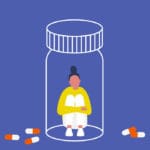Transcranial magnetic stimulation is becoming a more common form of treatment and with this growth comes increased research and awareness of the safety of this procedure with respect to seizures. There are many factors that impact the probability of seizures during TMS treatments. Overall, in healthy patients, the risk of experiencing seizures due to TMS is extremely low, <1% in most studies.
Risk Factors
While the vast majority of patients who undergo TMS will not experience any seizures, there are a number of risk factors that can increase the possibility of experiencing seizures.
Psychotropic Medication
Psychotropic medications have an interesting impact on the potential for seizures in TMS patients. Patients taking antipsychotic medications such as Olanzapine, Quetiapine, or Ziprasidone do have a slightly higher incidence rate of seizures independent of TMS treatments, but there is no concrete connection between these medications and seizures during TMS, as many have been used without incident. There is the potential for issues when switching medications prior to TMS treatments, as withdrawal from some medications can increase risk for seizures. If you change medications while undergoing a course of TMS treatment, at Mid City TMS we emphasize how important it is to redetermine the motor threshold and then the stimulus intensity is adjusted accordingly.
Traumatic Brain Injury Patients
Head injuries can increase the risk of seizures during TMS treatments. The severity of the brain injury is directly correlated with the risk of seizures, meaning that those with mild to moderate TBIs have a substantially lower risk of seizure compared to those with severe TBIs. A 2020 research literature analysis found that while the risk of seizure from TMS alone was rather low, underlying neuropathology can greatly impact the risk.
Alcohol Use
Alcohol use can have a strong impact on a number of aspects of your health, and this includes TMS treatments. Excessive alcohol use can have a serious impact on the risk of seizures during TMS treatment, with alcohol withdrawal having similar effects. One study reported that 6 out of 31 patients who experienced TMS-related seizures had a history of increased alcohol intake. If you’re planning on undergoing this treatment, it is recommended that alcohol intake not be altered prior to treatment.
Sleep Deprivation
In patients with epilepsy, sleep deprivation has long been identified as a trigger for seizures. With this in mind, it is likely that sleep deprivation may lead to an increased risk of seizure during TMS treatments.
Epilepsy
Patients with epilepsy are at the highest risk of experiencing seizures during TMS treatment, especially if they also have risk factors listed thus far. That being said, many patients who have epilepsy undergo this treatment without any issue. The risk of seizures during the treatment for patients with epilepsy is estimated to be around 2%, which is higher than the risk for patients without epilepsy, but remains relatively low.
Other Concerns
Seizures have been identified as one of the most serious adverse effects of TMS therapy, but the risk of this side effect in healthy patients remains incredibly low. Some researchers have concerns about TMS therapy’s lasting impact on seizure thresholds. This is similar to the phenomenon known as “kindling”, where “repeated subconvulsive electrical cortical stimuli eventually result in seizure activity.” However, this phenomenon has been shown only in animals and not in humans despite the use of similar stimuli. Overall, researchers have found that TMS-induced seizures are almost always transient and self-limiting. Even when patients experience seizures during this treatment, they have not led to any long-term, repeated issues.
Transcranial Magnetic Stimulation Treatment at MidCity TMS
While there are certain risks involved in transcranial magnetic stimulation treatment with respect to seizures, the overall research suggests that this risk is minimal.
At MidCity TMS, we have seen incredibly positive results from TMS therapy in patients with depression. We offer expert care that reduces risks of side effects like seizures and to ensure that our patients have the best possible experience. If you’re interested in pursuing TMS treatments, don’t hesitate to contact us for more information.



